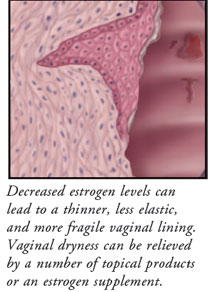 Low Estrogen Levels Lead to Inflammation
Low Estrogen Levels Lead to Inflammation
Vaginal dryness, a condition also known as atrophic vaginitis, is an inflammation of the walls of the vagina that results from low estrogen levels. In most women, vaginal dryness occurs as a result of menopause. Vaginal dryness causes such symptoms as burning or itching of the vaginal tissue, painful sexual intercourse, bleeding after intercourse, and urinary tract conditions, including burning and hesitancy or frequency of urination.
A vaginal examination in patients with atrophic vaginitis shows thinned, irritated, shiny, palecolored vaginal tissue. Women with this condition are more likely to develop secondary bacterial or yeast infections as a result of inflamed tissue and an increase in vaginal pH. Treatment for atrophic vaginitis includes vaginal creams or tablets that contain estrogen. If localized treatment is not effective, an oral estrogen or estrogen skin patch can be used. In many cases, a vaginal lubricant can help to eliminate dryness during sexual intercourse. Water-soluble vaginal lubricants are available in the pharmacy without a prescription.
Most Common During Menopause
Vaginal dryness is a common complaint in up to 40% of women during menopause and beyond. It is actually an inflammation of the vaginal tissues, which become thin and dry from lower estrogen levels. Estrogen keeps vaginal tissue healthy by helping to maintain an acidic environment, protecting the vaginal and urinary tract tissue from infections. With a lack of estrogen, the tissues change in both the vagina and urethra, leading to irritated tissues and increased risk of infection.
Causes and Symptoms
The most common cause of atrophic vaginitis is the normal decrease in estrogen due to menopause. After surgical removal of the ovaries, following childbirth, or during breast-feeding, women can also experience vaginal dryness from lower estrogen levels. Antiestrogen medications, such as leuprolide, danazol, medroxyprogesterone, nafarelin, or tamoxifen, can increase the risk of atrophic vaginitis. Women who smoke, who are not sexually active, or who have not given birth vaginally are also more likely to suffer from this condition.
Symptoms of vaginal burning, itching, pressure, or discharge are the most common complaints. Intercourse is often painful and may be followed by light bleeding. Urinary tract symptoms, including frequency and painful urination, may also accompany this condition.
Diagnosis of atrophic vaginitis is made by a simple examination of the vaginal walls, which appear thin, pale, and shiny and may even show small areas of bleeding. An ultrasound of the uterine lining may display a thinning of the endometrial tissue. The pH of the vaginal area can be higher than normal, and a Pap test can show cell changes characteristic of this condition. Blood testing reveals lower estrogen levels.
Reducing Discomfort
Treatment for atrophic vaginitis is aimed at reducing the discomfort of vaginal dryness during everyday activities and restoring lubrication during intercourse. Since atrophic vaginitis is caused by lower levels of estrogen, the most effective therapy is an estrogen supplement. Many doctors prefer vaginal estrogen products, which avoid the problems linked to oral estrogen replacement therapy. Vaginal estrogen products include creams, tablets, or a vaginal ring that releases estrogen once in place. These topical medications lack the side effects of systemic estrogen replacement therapy but are less convenient to use. Systemic estrogen replacement includes oral tablets and skin patches, slowly releasing the drug. The type of estrogen supplement, dose, frequency, and time needed to treat each patient is different and must be determined by a physician.
Most doctors recommend that postmenopausal women with atrophic vaginitis continue regular sexual activity if they are sexually active, as this helps to keep vaginal tissue healthy. Water-soluble vaginal lubricants are available in the pharmacy without a prescription; these products can help relieve dryness and pain during intercourse.
If you suffer from vaginal dryness due to low estrogen levels, your doctor can prescribe an estrogen product to relieve the symptoms of this condition. Your pharmacist can help you select a water-soluble vaginal lubricant to avoid pain and bleeding during intercourse and answer questions about estrogen replacement therapy.






